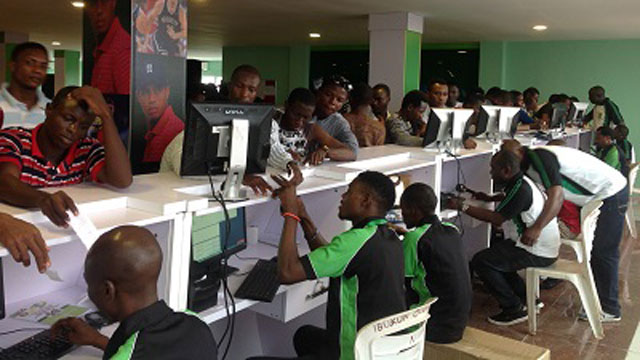May 13, (THEWILL)- Sports betting has, no doubt, taken Nigeria by storm, transcending age and social boundaries. What was once a niche pastime has now become a cultural phenomenon, captivating the nation’s youth and igniting a fervent desire for excitement and potential financial gain. However, beneath the surface of this seemingly innocuous pursuit lies a web of complexities that demands our attention and introspection, as echoed by the concerns raised by the House of Representatives and stakeholders.
The Speaker of the House, Hon. Tajudeen Abbas, has expressed grave concerns about the involvement of Nigerians, especially the youth, in high-risk games such as sports betting and gambling. He highlighted the dangerous consequences, including psychological and emotional instability, financial drain, workplace derangement, health issues, and family crises. The House Leader, Hon. Julius Ihonvbere, reiterated these worries, emphasising the obsession with gambling and the potential for utter ruin, posing a crisis for society and Nigeria’s socio-economic development.
On one hand, the sports betting industry has emerged as a significant contributor to the nation’s economy. With Nigerians spending a staggering N730 billion annually on this activity, the influx of cash has created employment opportunities and stimulated growth in various sectors, including entertainment and services. The thrill of engaging with one’s favourite sports teams, coupled with the prospect of massive wins, has transformed sports betting into a form of entertainment for many.
Yet, the allure of easy money and the normalisation of betting culture have given rise to a disturbing trend – the rise of problem gambling, particularly among the youth. Statistics reveal that a staggering 66 percent of Nigerians have placed a bet on a sporting event at least once, a figure that underscores the pervasiveness of this phenomenon. As gambling becomes increasingly accessible, with the convenience of mobile betting apps, the risk of addiction looms larger than ever before.
The National Institute for Policy and Strategic Studies (NIPSS) has called for an Executive Order to regulate sports betting activities in Nigeria, highlighting the urgent need to address the dangers. Sandra Agbor, the Abuja Head of NIPSS, advocated for a review of the Nigerian Lottery Regulatory Commission (NLRC) Act, 2005, to confront addiction, protect minors, and prevent fraud. She emphasised the establishment of treatment facilities and increased public awareness campaigns to educate the public, especially the youth, about the risks and negative effects of sports betting.
The House Committee on Inter-Governmental Affairs has also emphasised the need for proper regulation and supervision of the sports betting industry. The committee’s chairman, Hon. Canice Nwachukwu, stressed the importance of protecting children from becoming a nuisance due to their involvement in gaming and entertainment.
He suggested the introduction of a Central Monitoring System (CMS) to ensure a level playing field and address potential issues without becoming detrimental to societal progress.
The Association of Nigerian Bookmakers, the umbrella body for gaming operations, acknowledged the concerns about the potential dangers of gaming. Olafadeke Akeju, the Legal Officer, stated that all stakeholders have a role in ensuring the gaming industry operates with integrity, transparency, accountability, and responsibility to mitigate and address the associated risks.
The consequences of gambling addiction are far-reaching and devastating. Financial ruin, strained relationships, mental health issues, and increased crime rates are just a few of the potential pitfalls that plague those ensnared by the seductive lure of sports betting. Stories abound of individuals spiralling into debt, resorting to desperate measures, and ultimately shattering the foundations of their lives.
It is a stark reality that cannot be ignored, especially when considering the vulnerabilities of our youth. With limited financial stability and life experiences, they become easy targets for unscrupulous operators who prey on their naivety and the promise of quick riches. This dangerous intersection of immaturity and greed can have lasting impacts on their futures, jeopardising their potential and perpetuating a cycle of societal decay.
However, it would be shortsighted to dismiss sports betting entirely, for it holds the potential to be a responsible and regulated form of entertainment when approached with caution, moderation and regulation. The challenge lies in striking a delicate balance – one that harnesses the economic benefits while mitigating the risks and protecting the most vulnerable members of society.
This is where the role of regulatory agencies like the NLRC becomes paramount. They must rise to the occasion, implementing stringent measures to ensure that sports betting operates within a legal framework that prioritises consumer protection and prevents exploitation. This includes establishing robust licensing requirements, conducting regular audits, and enforcing severe penalties for non-compliance.
Furthermore, educational campaigns are crucial in raising awareness about the risks of excessive gambling. By equipping individuals, especially the youth, with the knowledge and tools to navigate this landscape responsibly, we can empower them to make informed decisions and safeguard their well-being.
Ultimately, the fate of sports betting in Nigeria rests in the hands of those who wield the power to shape its trajectory. It is a choice between embracing the potential benefits while addressing the inherent dangers, or turning a blind eye to the societal implications that could lead to a destructive path.
As a nation, we must confront this issue head-on, fostering an environment of transparency, accountability, and responsible enjoyment. Only then can we truly harness the allure of sports betting while safeguarding the well-being of our citizens and the fabric of our society.

